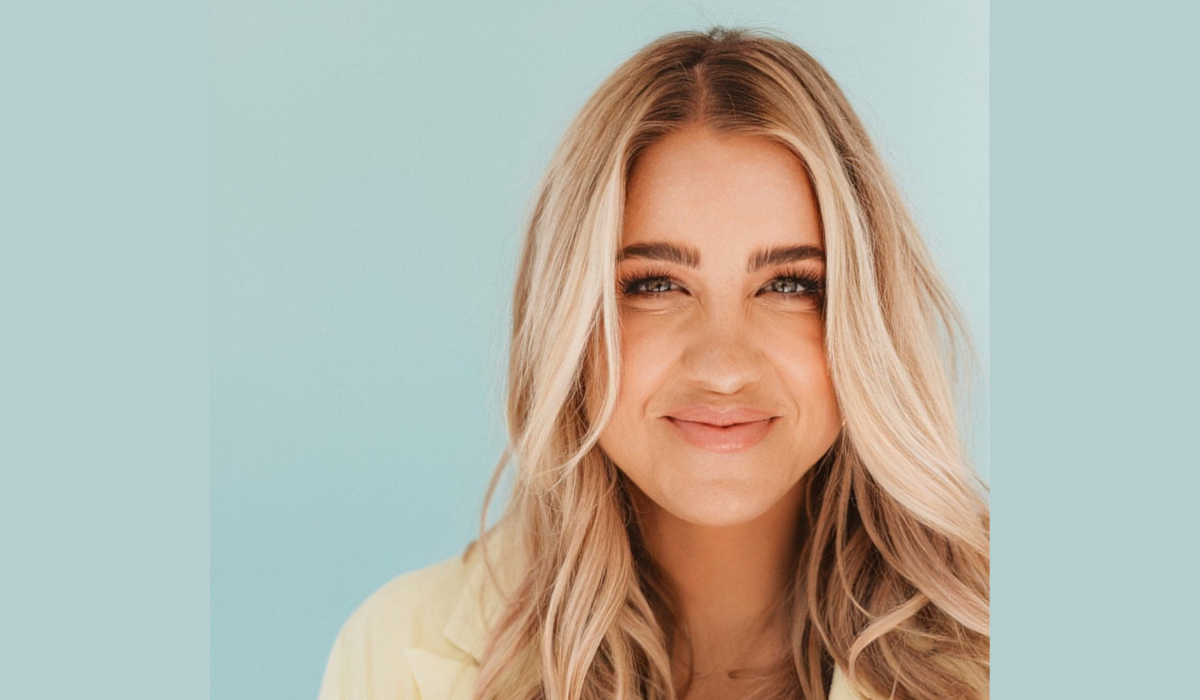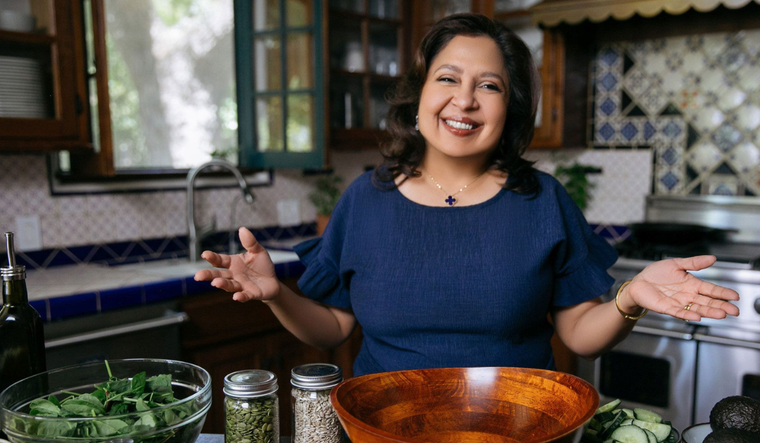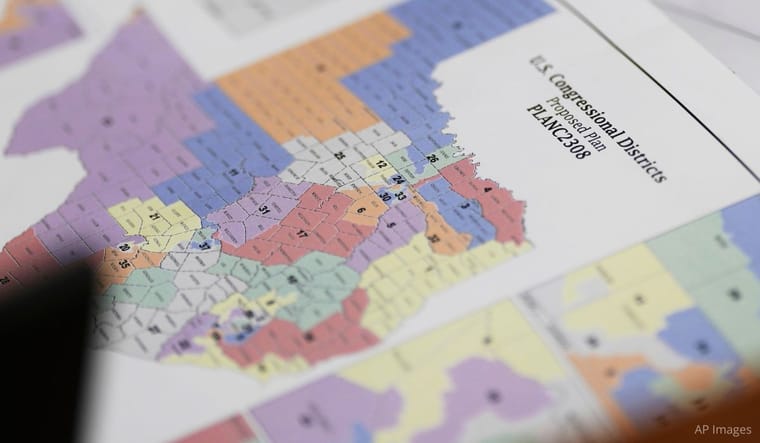What's the One Question We Should All Be Asking Ourselves and Our Friends? Best-Selling Author and Podcast Host Jenna Kutcher Has the Answer
Confession: I’m not one for small talk.
(Please, if we ever meet, don’t ask me about the weather. There are apps for that!) I’d rather talk to you about your impending divorce, the new organizational hack you just learned, that viral TikTok caprese salad, your toddler’s tantrum, or the odd shape of that mole under your armpit that you really should get checked. Small talk drains me. It sucks the life out of me. I’m like a scuba diver that wants to venture wayyyy down into the depths, like ear-poppingly deep. Leave that surface stuff to the snorkeler floating at the top with their butt bobbing out of the water, you know?
And yet, these days, small talk feels like it’s the norm. Whether it’s the cashier at Target, the neighbor in your cul-de-sac, or that friend you haven’t had a chance to sit with in over a year, it seems like it’s hard to get past the “good” and “busy” responses to the question that most people ask (but don’t really have enough time to hear the response): How are you? But let’s be honest; it’s easy to see why many of us don’t really know how to answer that question. We’re not going to dive straight into the aches and pains of our plantar fasciitis with the barista in the Starbucks window. (With some relationships, you have to snorkel before you can deep dive.)
But the rest of them? Those inner-circle relationships with the people who have our back? We must be willing and wanting to explore the depths a little more. Sometimes, our brains simply stay in the habit of trying to connect the dots for the easiest, quickest response to offer. And sometimes we’re afraid to burden a close friend with the truth, or are scared to show a different side of us that stays hidden when we talk about the weather or the local football team or that one soup recipe on Pinterest.
We tend to take the most direct route to Get me out of this conversation before I expose myself, just like we let Siri reroute us around the rubble of road construction. We avoid the curves, the dips in the road, and the dust of our lives in conversation. We quickly reroute to safe territory or take the quickest exit to keep us safe from answering the bigger question. It’s like we want others to pay attention, but not so closely that they ask us about the real stuff, the personal stuff, the It’s a long story, so who would even want to listen to it? stuff.
Beyond getting really honest about the things that might not be okay, we stifle the things that make us come alive. It’s like we all end up chattering about on this banged-up planet carrying these big dreams and audacious goals and boundary-breaking ideas, and we keep them quiet. All throughout the week—in the checkout line, on the conference call, around the dinner table—we are walking around with wild parts of ourselves left unspoken.
But have you ever felt the feeling that comes when you cut the fluff, get past the small stuff, and are asked, “How are you, really?” Just the addition of that one precious word, that small invitation to cut the crap and stop with the niceties and be real with yourself and whoever is brave enough to ask it? It feels like a gulp of oxygen, like coming to the surface and seeing the light again. So why don’t we do this every moment we can? What are we running from, drowning out, and keeping under lock and key?
The answer.
The truth is, we’re scared of what might come out if we pause to pose the question with honesty—not only to the people in our lives, but to ourselves. We’re scared of what we’d hear if we got quiet enough to ask ourselves the questions that matter. Is there more out there? Is this it? Am I actually happy? What now? What’s next? What’s wrong?
When these questions come to the surface, most of us shove them back down, grab the smoothie, run out the door, and get on with our day, keeping ourselves busy so we don’t actually pause long enough to have to sit with the responses. But the answers to our deep questions somehow find their way into our lives. They return to us in the middle of the night, or when we’re driving to that thing we wish we hadn’t committed to. They come after the toddler spills the Cheerios on the floor or the teenager rolls her eyes for the seventeenth time that day.
And like we’ve been conditioned to do, we just keep going, keep pushing, keep smiling, and keep reminding ourselves that we are lucky, we are blessed, and we should be thankful. That same old song with the cheap lyrics. We tell ourselves so many others have it far worse than us. Or it’s probably our fault we aren’t content or happy, and we should just “choose joy” like the coffee mugs and water bottles say.
Listen: not every feeling is a choice. As if life is simply a menu of delicious options and we just need to choose! As if the world isn’t burning and the oceans aren’t rising! As if our pain can’t exist because others have pain, too. As if accessing more difficult, complex emotions like sadness, discontent, or futility means we’re doing this all wrong.
(Hear me loud and clear: it doesn’t.) There will be times in our lives where joy is not an emotion we can access in the moment, and in those times, the goal isn’t to just choose it. The choice we do have is to ask ourselves when we last felt it, and to dig hard for that answer. But when we shame ourselves for not choosing the convenient response (#blessed), or for not displaying what we think is the socially acceptable response to whatever situation we’re in, we distract from the real work. We try to outrun the longings, try to forget about our wants, try to silence every deep doubt and deeper dream. Or we reach for whatever might numb the feelings we can’t silence. Because sometimes seeking out the answers becomes too painful, especially when we think we have to ask them in the shadows where we won’t bother anyone. Where no one can hear that we’re actually admitting we’re not happy or that life hasn’t turned out how we thought it would.
It’s no surprise we’re exhausted. Before we’re even fully awake, we start scrolling through everyone else’s opinions and ideas and solutions—our news feeds, our Facebook page, our Instagram feeds. We crowdsource our life to push us toward something else, to distract us, to lose those 3:00 a.m. thoughts in the comforting chaos of the latest craze. We set goals we think we’re supposed to, we buy the bestselling planner, we create the resolutions that sound nice to (and for) everyone else, and we hope for the promise that on Monday it’ll all be different.
But most of the time, on Monday, we wake to reality, again—that the five-star magic diet plan didn’t work. Those meditations still haven’t sunk in. We’ve been grinding our teeth again. That same stressor keeps getting in the way every single time you attempt to journal, strategize, or manifest your way to happiness.
And we decide that surely the problem is us? Surely we’re doing something wrong? It always comes back to us and the many ways we assume we’re incapable. We wonder, do we just need, like, three more yoga classes to make it click? Do we just need to wake up earlier?
The fill-in-the-blank, $99.99 solution is working for everyone else, isn’t it? At least, that’s what the ads say. That’s what the wellness guru preaches. That’s what the book promised.
So why isn’t it working for me?
Spoiler alert: that thing you’re doing isn’t working for you because it didn’t come from you. That “answer”—the diet, the planner, the four-step-manifestation plan—came from something (or someone) outside of you. It came from Amazon. It came from an influencer or that wellness guru. It came from your sister or your sister’s neighbor or her sister’s neighbor’s best friend.
We can’t always solve our own problems with someone else’s solutions. We can’t always find our own selves using someone else’s directions. And we sure as hell can’t always question our lives clearly if we don’t close our eyes to the nonstop jazz hands of every other answer parading by.
When we look to the crowd to answer our deepest questions, we move in whatever direction we’re carried. We stop looking within, stop checking in, stop carrying our own visions, because what is inside of us perhaps doesn’t match the identities our world keeps telling us to clothe ourselves in. Instead, our gaze catches the motions of the crowd and we sync up. We become people who know how to go with the flow more than anything else. And we end up exhausted and bruised, numb to ourselves, lost down a path we don’t even remember turning on.
But this time it’s going to be different. This time, you’re going to hear your voice—not your best friend’s, not your mother’s, and not that one girl’s on Instagram. (Yeah, that includes me.)
How are you, really?
From HOW ARE YOU, REALLY? by Jenna Kutcher. Copyright © 2022 by Jenna Kutcher. Reprinted by permission of Dey Street Books, an imprint of HarperCollins Publishers. You can purchase the book here.
Please note that we may receive affiliate commissions from the sales of linked products.



